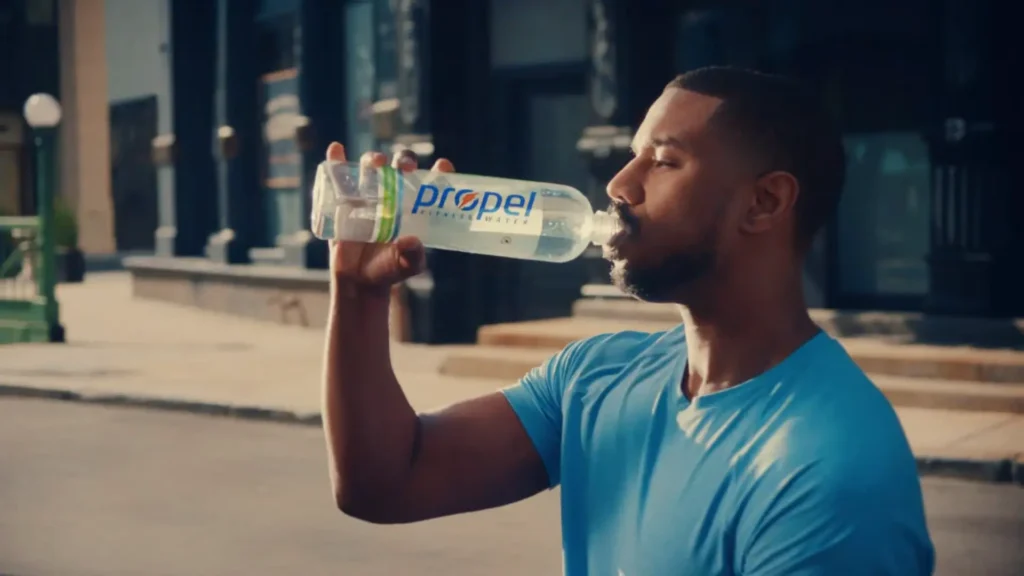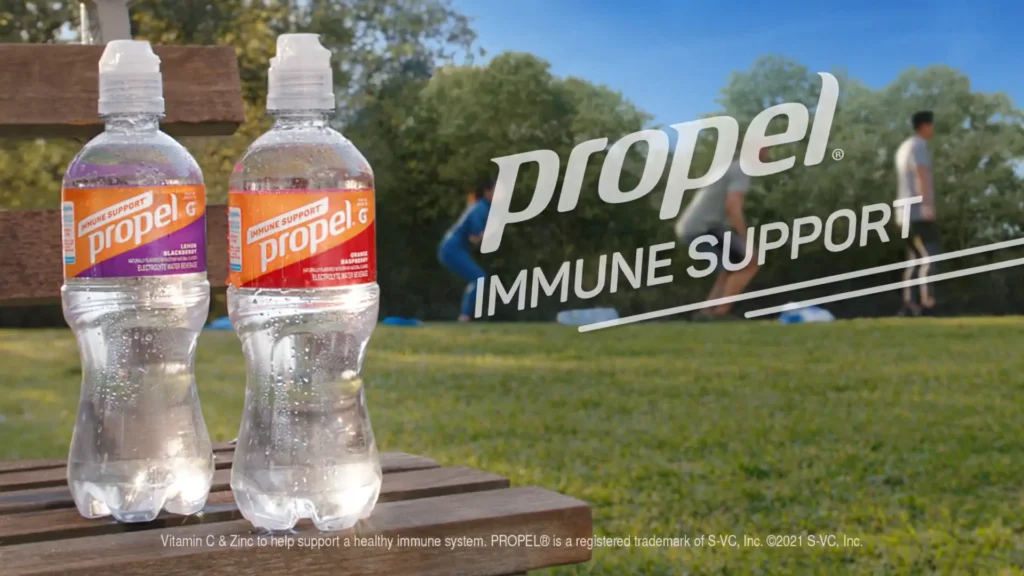Propel is a flavored water drink that helps you stay hydrated and replenishes your electrolytes. It does not contain any caffeine, making it a good choice if you want a refreshing drink without the added stimulant.
Does Propel have caffeine? It’s a common question that many people wonder about. In this blog post, we’ll explore what Propel is, its caffeine content, and additional details you should know.
What is Propel?
Propel is a popular water-enhancing beverage designed to provide a healthier alternative to sugary drinks like soda. Widely available in supermarkets, convenience stores, and vending machines, Propel is known for its variety of flavors and health benefits.
Propel contains a blend of vitamins, minerals, and electrolytes, making it an excellent choice for athletes and active individuals. These components help maintain hydration, replenish lost nutrients, and support overall health.

Propel’s formulation is specifically designed to aid in rehydration after physical activities, ensuring that your body stays balanced and energized.
Some people find Propel energizing and refreshing due to its ingredients, which might include caffeine in certain variants.
However, it is crucial to monitor how your body reacts to Propel, especially if it contains caffeine. While caffeine can boost energy levels and alertness, excessive intake may lead to jitters or other side effects.
Overall, Propel offers a tasty and convenient way to stay hydrated and maintain a healthy balance of essential nutrients. Always pay attention to your body’s response to caffeinated beverages and enjoy Propel as part of a balanced diet and active lifestyle.
Does Propel Have Caffeine?
One of the most common questions about Propel electrolyte water is whether it contains caffeine. To clarify, Propel does not have any caffeine.
Despite the absence of caffeine, Propel can still provide an energy boost. It is enriched with B vitamins, which can naturally enhance your energy levels without relying on caffeine or other stimulants. These vitamins play a crucial role in energy production within the body, helping you stay energized throughout the day.
In addition to B vitamins, Propel is packed with electrolytes and minerals, including sodium and potassium. These components are essential for replenishing nutrients lost during physical activity, ensuring you stay hydrated and balanced.
If you seek a refreshing, caffeine-free way to rehydrate and boost your energy, Propel is an excellent choice. It supports your body’s hydration needs and helps maintain optimal performance.
Nutritional Facts of Propel
Propel water is formulated to provide essential electrolytes such as sodium and potassium, which are crucial for maintaining fluid balance and supporting various bodily functions.
These minerals play a significant role in chemical reactions within the body, ensuring the proper fluid balance inside and outside of cells. They also help regulate muscle function, reduce cramps, and improve recovery time after exercise.
A typical bottle of Propel contains zero calories and no sugar, making it a healthier option compared to other sports drinks. Key nutrients found in Propel include:
- Vitamin B3 (Niacin)
- Vitamin B5 (Pantothenic Acid)
- Vitamin B6 (Pyridoxine)
- Vitamin C (Ascorbic Acid)
- Vitamin E (Alpha-Tocopherol)
- Potassium (as Potassium Citrate)
- Sodium (as Sodium Citrate)
Comparison with Other Beverages
Compared to similar beverages like Gatorade, which contains 50 calories and 14 grams of sugar per bottle, Propel offers a lower-calorie alternative while still providing essential nutrients.
Propel also offers a special line called Propel Immune Support, which provides 3.6 times more vitamin C and includes 3.3mg of zinc per bottle, enhancing immune support.
Controversial Ingredients
One of the most debated aspects of Propel is its use of artificial sweeteners. While these sweeteners give Propel its distinctive taste, they may not be suitable for everyone. It is important for consumers to be aware of their own dietary preferences and needs when choosing a beverage.
Also Read: Does Mountain Dew Baja Blast Contain Caffeine?
Is Propel Water Good for You? Benefits of Propel Water
Propel water offers numerous health benefits, primarily focused on hydration, electrolyte replenishment, and vitamin supplementation.
Hydration and Electrolyte Replenishment
Electrolytes are crucial for maintaining the body’s fluid balance and supporting various physiological functions. Propel contains essential electrolytes like sodium and potassium that help replace those lost during physical activity, aiding in optimal hydration and preventing dehydration.
Vitamin Fortification
Propel water is fortified with several vital vitamins, including:
- Vitamin C: Supports the immune system and acts as an antioxidant.
- Vitamin E: Protects cells from damage.
- B Vitamins: Improve mental function and energy levels.
These vitamins contribute to overall health by boosting the immune system, enhancing mental clarity, and helping to prevent chronic diseases.
Zero-Calorie Beverage
One significant advantage of Propel is that it is a zero-calorie drink. Unlike soda or fruit juices, Propel does not add any unnecessary calories to your diet, making it an excellent choice for those looking to maintain or lose weight.
Conclusion
In summary, Propel water is a beneficial, caffeine-free beverage that supports hydration, replenishes essential electrolytes, and provides vital vitamins. Its zero-calorie formulation makes it a healthier alternative to sugary drinks, helping you stay hydrated and nourished without extra calories.
How Much Caffeine is in Propel? (Unveiled Now)
Propel water is a popular sugar-free, flavored water enhanced with vitamins and electrolytes. A common question is whether Propel contains caffeine. The answer is no; Propel does not contain any caffeine.

Potential Side Effects and Risks of Propel Water
While Propel provides numerous health benefits, it is important to be aware of potential side effects and risks, particularly due to its artificial sweeteners.
Artificial Sweeteners in Propel
Propel contains sucralose and acesulfame potassium, both deemed safe by the FDA. However, concerns remain:
- Sucralose: Associated with increased blood glucose and insulin levels.
- Acesulfame potassium: Some research (primarily in mice) indicates potential links to cancer, hormone imbalances, and changes in brain function.
A 2023 study found that high sucralose intake during pregnancy could cause metabolic disruption and low-grade inflammation in newborns, predisposing them to weight gain.
The American Cancer Society states there is no clear evidence that approved artificial sweeteners cause cancer. However, the National Cancer Institute references a study indicating a slightly higher cancer risk (1.13 times) for those consuming acesulfame potassium.
Safe Consumption Levels
It is crucial to consume artificial sweeteners within safe limits:
- Acesulfame potassium: 15 mg per kg of body weight.
- Sucralose: 5 mg per kg of body weight.
Possible Individual Reactions
Some individuals may experience sensitivities to artificial sweeteners, such as:
Excessive consumption of Propel Water may also lead to flushing due to its vitamin B6 content.
Preservatives and Additives in Propel
Propel contains several additives considered safe within acceptable doses:
- Sodium hexametaphosphate: A thickening and emulsifying agent, approved by the FDA.
- Potassium sorbate: A preservative with an acceptable daily intake of 3 mg per kg of body weight, as established by the EFSA.
- Calcium disodium EDTA: A preservative and flavoring agent, safe at 0.9 mg per pound (1.9 mg per kg). Most individuals consume significantly less than this amount.
Conclusion
Propel water is a beneficial, caffeine-free beverage that supports hydration and provides essential nutrients. However, it is important to be mindful of its artificial sweeteners and additives. Consuming Propel within recommended limits allows you to enjoy its benefits without experiencing adverse effects.
Is Propel Water Actually Healthy?
I used to be a Gatorade addict until Propel rolled along. Tell me something that tastes better than a Kiwi Strawberry Propel after a youth soccer game. I’ll wait. But Propel isn’t just for kids. Whether it’s a hot summer day, I’m on a hike, or just want a solid afternoon pick-me-up, Propel is downright addicting.

I have countless memories of my mom insisting that Propel is a healthy choice. Honestly, I never questioned it. Until now. Is Propel actually healthy? Is it healthier than Gatorade? And more importantly, will it break a fast or pull you out of ketosis? Here’s the lowdown.
Is it Okay to Drink Propel Instead of Water?
While Propel water can be a good alternative to sugary sports drinks or sodas, it should not be used as a substitute for water.
Firstly, you don’t want all your daily drinks to contain artificial sweeteners. Secondly, drinking too much Propel can lead to an unhealthy amount of sodium intake, which is associated with high blood pressure and lower immune system function.
If you want those electrolytes, try coconut water as a substitute for sports drinks. It maintains hydration with the same efficacy.
Conclusion
Propel water is beneficial for rehydration and nutrient replenishment, especially after physical activities. However, it should be consumed in moderation and not replace regular water intake to ensure a balanced and healthy diet.
Also Read: Does Acai Have Caffeine?
Can I Drink Too Much Propel?
Yes, consuming too much Propel can lead to an excessive intake of electrolytes, particularly sodium. When combined with sodium from salty snacks or other foods throughout the day, the sodium in Propel can add up quickly. Excessive sodium intake can raise blood pressure, has been linked to premature death, and might reduce immune cell function.
Although sodium is an essential mineral, the Chronic Disease Risk Reduction (CDRR) intake is set at 2,300 milligrams per day. To lower the risk of chronic disease, it’s important to stay under this limit.
Additionally, the Mayo Clinic advises consuming artificial sweeteners found in Propel only in small amounts occasionally. If you’re drinking a case of Propel daily, it’s a good idea to cut back.
Can Propel Help with Weight Loss?
It depends. Propel doesn’t contain any calories or added sugar, making it a great replacement for sugary drinks like soda, juice, or sweetened coffee. However, Propel itself is not a magic solution for weight loss. Switching from sugar to zero-calorie sweeteners can lead to short-term weight loss if it reduces overall calorie intake.
However, long-term use of artificial sweeteners has been linked to an increased risk of obesity, type 2 diabetes, cardiovascular disease, and mortality. Therefore, while Propel can help reduce calorie intake in the short term, it might not be the best choice for long-term weight loss or overall health.
Conclusion
Propel water is a caffeine-free beverage that supports hydration with added vitamins and electrolytes. While it is a healthier alternative to sugary drinks, it should be consumed in moderation to avoid excessive sodium and artificial sweetener intake. Propel can aid in short-term weight loss by reducing calorie intake, but it may not be ideal for long-term health.
When Should I Drink Propel Water?
Propel water is best consumed during or after physical activity to rehydrate and replace lost electrolytes through sweat. Electrolyte replenishment is crucial during prolonged high-intensity activities lasting over an hour or in situations with excessive sweating, such as hot temperatures.
While Propel is beneficial for electrolyte replenishment, it is not irreplaceable. After exercise, electrolytes can often be restored with just water and a balanced snack. However, Propel can be a good alternative to sugary sports drinks and sodas.
Additionally, there are other situations where electrolyte imbalance can occur, such as after prolonged periods of diarrhea from foodborne illness or laxative abuse. In these cases, drinking Propel can help balance electrolytes quickly.
Conclusion
Propel water is a caffeine-free beverage designed to support hydration and electrolyte balance. It is ideal for consumption during or after physical activity and can also be helpful in other situations where electrolyte replenishment is needed.
However, it should not completely replace regular water intake to ensure adequate hydration throughout the day.
Also Read: Does Fresca Have Caffeine?
Is Propel Healthier than Gatorade?
Yes. A 20-ounce bottle of Propel contains 0 calories and 0 added sugars, whereas a 20-ounce bottle of Gatorade contains 140 calories and 36 grams of sugar. That’s a significant amount of sugar.
In rare cases, if you are an athlete in need of rapid carbohydrate supplementation post-workout, Gatorade might be beneficial.
However, refueling with Propel (or a better option—an electrolyte beverage without artificial sweeteners and low to no sugar) along with a snack, like a protein bar or an apple with peanut butter, can be equally effective.
Gatorade also contains red dye 40. Although the World Health Organization claims Red 40 does not present a health concern, it contains benzidine—a known human carcinogen permitted in food products in low amounts. Propel, on the other hand, does not contain any artificial colors.
How Much Propel is Safe to Drink?
While Propel water is generally safe to consume in moderation, it is important to be mindful of the amount of artificial sweeteners you ingest. The side effects and risks associated with artificial sugars suggest that water should remain your primary source of hydration.
One serving or bottle of Propel water is generally considered safe, but individual tolerance to artificial sugars may vary.
Wrapping Up
Propel water is a good alternative to sugary sports drinks and sodas. It contains essential vitamins and electrolytes that support hydration and athletic performance. However, it should not be used as a substitute for regular water intake.
In conclusion, Propel water can be beneficial when consumed in moderation. The key takeaway is to stay hydrated by drinking enough water each day and using Propel as a supplement when needed.
FAQs: How Much Caffeine is in Propel? (Unveiled Now)
Does Propel energize you?
Yes, but not due to caffeine. Propel is a sugarless, colorless hydration drink that includes vitamins C and E for antioxidants, vitamin B for energy, and zinc to support your immune system.
Are Propel drinks healthy?
Propel drinks are low in calories and provide essential vitamins and electrolytes. However, they contain artificial sweeteners such as Sucralose and Ace-K, which some health experts recommend avoiding.
Is Propel just Gatorade?
Propel® Electrolyte Water Beverage offers the same electrolytes as Gatorade® but without the sugar. It is enhanced with B vitamins and antioxidant vitamins C & E to support an active lifestyle and maintain good health.
Does Propel keep you awake?
No. Propel does not contain caffeine.
What are the side effects of drinking Propel?
Serious side effects of Propel can include:
- Bloody mucus or unexplained nosebleeds
- Chills
- Cold symptoms
- Cough
- Fever
- Headache
- Hoarseness
- Increased abdominal or stomach pain and cramping during menstrual periods
Is Propel bad for your teeth?
Propel, marketed as an electrolyte water beverage, adds flavor and electrolytes to water. However, its lower pH levels compared to regular water can contribute to enamel erosion, though at a slower rate than more acidic drinks.
Is Propel safe for fasting?
Yes, Propel Powder Packets are popular for replenishing electrolytes during intermittent fasting without breaking the fast.
Does Propel have caffeine in it?
None. There’s no caffeine added to Propel.
Why does Propel make me pee?
Drinking Propel can lead to increased urination due to its electrolyte content, such as sodium and potassium. These electrolytes act as diuretics, promoting the excretion of water and electrolytes from the body, causing more frequent urination.
Is Propel ok for kids?
Propel can be safe for kids in moderation. However, the Propel Zero formula contains no calories, which might not be suitable for children engaging in strenuous activities that require additional energy intake.
Drawbacks for Kids
For those using Propel as a sports drink, it’s important to note that the lack of calories in Propel Zero may not provide the necessary energy for children or adults during intense physical activities.
Propel Ingredients
Propel includes the following ingredients:
- Water
- Citric Acid
- Sodium Hexametaphosphate (to protect flavor)
- Salt
- Natural Flavor
- Potassium Sorbate (preserves freshness)
- Potassium Citrate
- Sodium Citrate
- Ascorbic Acid (Vitamin C)
- Sucralose
- Acesulfame Potassium
- Calcium Disodium EDTA (to protect flavor)
- Calcium Pantothenate (Vitamin B5)
- Niacinamide (Vitamin B3)
What sweetener is in Propel?
The Propel electrolyte bottled waters and powder packets are sweetened with Acesulfame Potassium (Ace-K) and sucralose.
Does Propel have aspartame?
No, Propel does not contain aspartame. The sweeteners used in Propel products are Acesulfame Potassium (Ace-K) and sucralose.
Are there any bad ingredients in Propel?
Propel contains preservatives such as Potassium Sorbate and Sodium Hexametaphosphate. Potassium Sorbate is a widely used man-made preservative to prevent spoilage in food, drinks, and personal care products.
My brother recommended I might like this web site He was totally right This post actually made my day You cannt imagine just how much time I had spent for this information Thanks